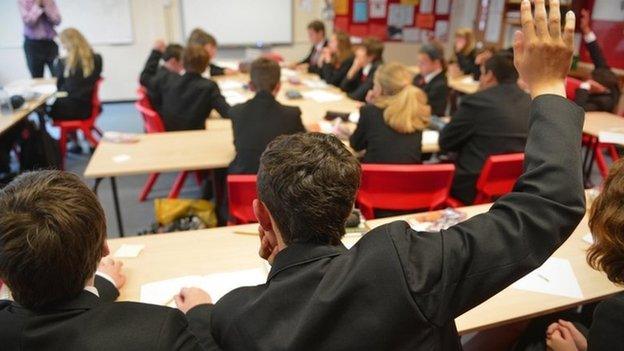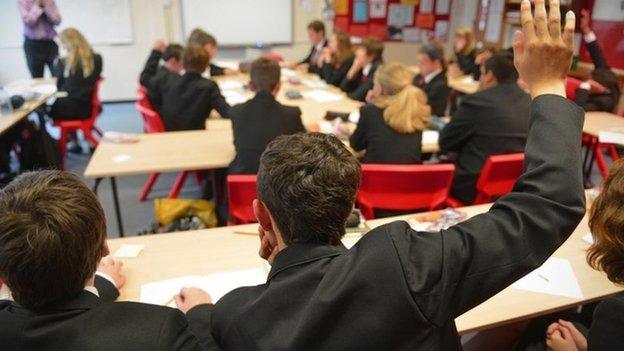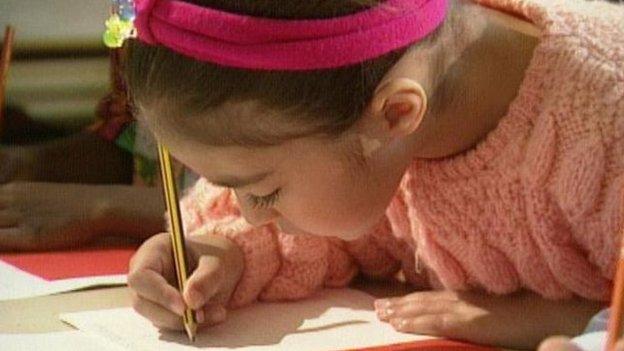EIS chief says schools cannot fix poverty problems alone
- Published

Tommy Casltes said "storm clouds" were gathering over the future direction of education policy
Schools alone cannot solve the "deep endemic problems" in the education system caused by poverty, an outgoing union chief has warned.
Tommy Castles, president of the Educational Institute of Scotland (EIS), said poverty eradication should be a "prime objective" of governments.
Education Secretary Angela Constance said last month that poverty "should not be used as an excuse for failure".
Ms Constance said the EIS was right to highlight the "challenge" of inequity.
Mr Castles will step down as president of the EIS at its AGM in Perth, with Mr Castles saying the event was taking place "as the storm clouds gather once again over the future direction of education policy".
He also used his platform as the outgoing president of Scotland's largest teaching union to say the primary curriculum should be "decluttered", teachers' workloads needed to be addressed, and council cuts should not cause provision for pupils with additional support needs to suffer.
'Prime objective'
He said: "Pulling the levers in education and blaming teachers will not solve the deep endemic problems caused by poverty. Education cannot solve the problems on its own.
"We must not lose sight that the prime objective in a wealthy country like ours should be to eradicate poverty."
Mr Castles added: "Education must be seen within the wider context of the whole of society. We can't fix the social and economic impact of poverty on children. Pulling a lever won't work."
Responding to a drop in reading and writing skills recorded in the Scottish Survey of Literacy and Numeracy, external (SSLN) last month, Ms Constance said: "While the Scottish government is committed to doing all that it can to eradicate poverty and that poverty can be a barrier to attainment, it should not be used as an excuse for failure."
Mr Castles also urged ministers to "declutter" the curriculum in primary schools, adding: "Accelerate the moves to reduce bureaucracy. Give teachers time to teach and let us get on with what we are trained to do, educate children."
With teachers' workload "still a major issue", he said the Curriculum for Excellence (CfE) reforms were "still one of our main drivers" for this in primary schools.
In secondary schools, the new National 4 and 5 Qualifications, which replaced Standard Grades from last year, is the main cause of concern over workloads.
Last year's exam process was a "nightmare for all involved", including pupils, parents and teachers, he said, adding that while changes had been made some "issues have not been resolved, and that is both in terms of workload and concerns over attitudes being formed by, and about, pupils to some of those assessments".
'Unforgiving tide'
The EIS president also used his speech to criticise the "unnecessary austerity" imposed by the Conservatives in government, saying this had done "so much harm to our communities, to our standard of life and has inflicted savage cuts to all areas of the public sector with consequences for the quality of the education we can provide".
With council budgets across the country being squeezed, he said the EIS must ensure that provision for pupils with additional support needs does not suffer.
College budgets should be restored, he told the AGM, saying the further education sector had faced cuts of 20% since 2010 "which has seen courses and teaching posts lost".
Responding to Mr Castles' comments, Ms Constance said she shared his concern about the impact of austerity measures on efforts to close the attainment gap for children from Scotland's most deprived communities.
She added: "We are all swimming against an unforgiving tide of funding cuts, so it is important we work together on this common goal.
"We need an education system that is fair and which provides excellence to every child, irrespective of their background or circumstances.
"As parents, teachers, schools, local and central government, we all have a role in this."
- Published29 May 2015

- Published26 May 2015

- Published25 May 2015

- Published29 April 2015

- Published30 April 2014
.jpg)